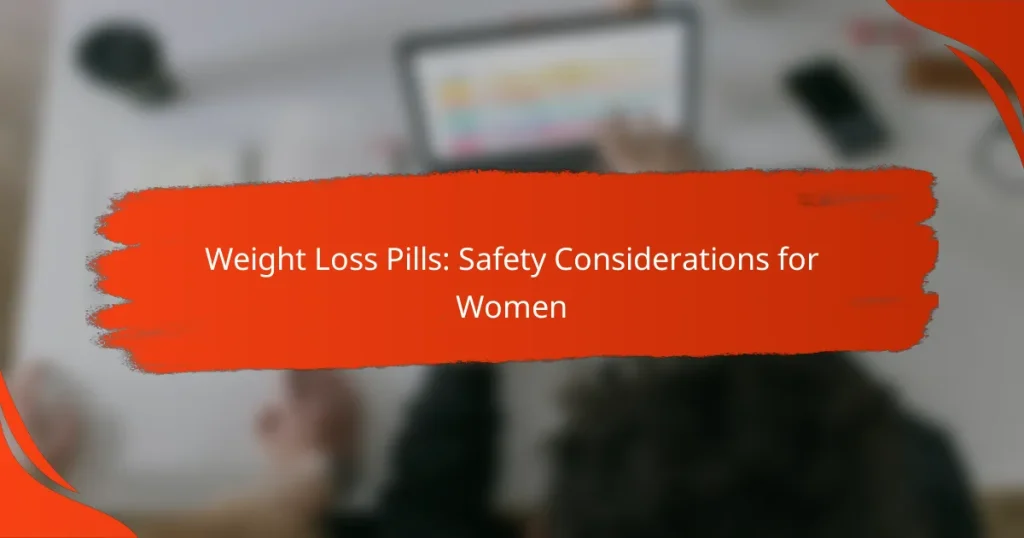When considering weight loss pills, women must prioritize safety by choosing products with natural ingredients and scientific backing. Popular options like Garcinia Cambogia and Green Tea Extract can aid in weight loss, but it’s crucial to consult a healthcare professional to assess individual health conditions and potential side effects. By carefully evaluating these factors, women can make informed decisions that support their weight loss goals while safeguarding their overall well-being.

What are the safest weight loss pills for women?
The safest weight loss pills for women typically include natural ingredients and are backed by research. Options like Garcinia Cambogia and Green Tea Extract are popular, but it’s essential to consider individual health conditions and consult a healthcare professional before starting any supplement.
Garcinia Cambogia
Garcinia Cambogia is a tropical fruit extract that is often marketed as a weight loss aid. It contains hydroxycitric acid (HCA), which may help reduce appetite and inhibit fat production. While some studies suggest it can aid weight loss, results can vary significantly among individuals.
When considering Garcinia Cambogia, look for products that contain at least 50% HCA for effectiveness. Always check for third-party testing to ensure product quality and safety.
Orlistat
Orlistat is a prescription medication that works by blocking the absorption of dietary fats in the intestines. It can lead to modest weight loss when combined with a low-fat diet. However, it may cause gastrointestinal side effects, such as oily stools and flatulence.
This medication is typically recommended for individuals with a BMI over 30 or those with weight-related health issues. It’s crucial to follow a balanced diet while using Orlistat to minimize side effects and maximize weight loss results.
Phentermine
Phentermine is a prescription appetite suppressant that can help with short-term weight loss. It works by stimulating the central nervous system to reduce hunger. However, it is generally prescribed for individuals with a BMI over 30 and is not intended for long-term use due to potential side effects.
Before using Phentermine, discuss your health history with a doctor, as it may not be suitable for those with certain cardiovascular conditions. Regular monitoring is essential while on this medication.
Conjugated Linoleic Acid (CLA)
Conjugated Linoleic Acid (CLA) is a fatty acid found in meat and dairy products that may help reduce body fat and improve lean muscle mass. Some studies indicate it can aid weight loss, but results are often modest and vary widely among users.
CLA supplements are generally considered safe, but it’s advisable to choose products from reputable brands. Combining CLA with a healthy diet and exercise can enhance its effectiveness.
Green Tea Extract
Green Tea Extract is derived from green tea leaves and is rich in antioxidants, particularly catechins. It is believed to boost metabolism and promote fat burning, making it a popular choice for weight loss. Some studies suggest it can help reduce body weight and fat, especially when combined with caffeine.
For effective results, look for supplements that contain a high concentration of EGCG, the active compound in green tea. Incorporating green tea into your daily routine can also provide additional health benefits beyond weight loss.

How do weight loss pills affect women’s health?
Weight loss pills can significantly impact women’s health by influencing various physiological processes. These effects can range from changes in metabolism to potential side effects that may affect overall well-being.
Potential side effects
Weight loss pills can lead to a variety of side effects, which may vary based on the specific formulation. Common side effects include nausea, headaches, and digestive issues. More severe reactions can occur, such as increased heart rate or high blood pressure, particularly with stimulants.
Women should consult healthcare professionals before starting any weight loss medication to understand potential risks and monitor for adverse effects. Keeping a record of any side effects experienced can help in evaluating the safety of the chosen pill.
Impact on hormonal balance
Some weight loss pills can disrupt hormonal balance in women, affecting hormones such as estrogen and progesterone. This disruption may lead to irregular menstrual cycles or other reproductive health issues. It’s crucial to consider how these medications might interact with hormonal contraceptives or hormone replacement therapies.
Monitoring hormonal changes while using weight loss pills can help identify any negative impacts early. Women experiencing significant changes should seek medical advice to adjust their approach to weight management.
Effects on metabolism
Weight loss pills often aim to boost metabolism, which can lead to increased calorie burning. However, the extent of this effect can vary widely among individuals. Some pills may enhance metabolic rate temporarily, while others may not provide significant benefits.
It’s essential to combine weight loss pills with a balanced diet and regular exercise for optimal results. Relying solely on pills without lifestyle changes may lead to unsustainable weight loss and potential health risks.

What should women consider before taking weight loss pills?
Women should carefully evaluate several factors before using weight loss pills, including their health status, potential side effects, and the ingredients in the pills. Understanding these considerations can help ensure safety and effectiveness in weight loss efforts.
Consulting healthcare professionals
Before starting any weight loss pill, women should consult with healthcare professionals, such as a doctor or a registered dietitian. These experts can provide personalized advice based on individual health needs and medical history.
Healthcare professionals can also help identify any potential interactions with existing medications or conditions, ensuring that the chosen weight loss method is safe and appropriate.
Understanding personal health conditions
Women should assess their personal health conditions, such as hormonal imbalances, metabolic disorders, or cardiovascular issues, before taking weight loss pills. Certain health conditions may increase the risk of adverse effects from these products.
For example, women with thyroid issues should be particularly cautious, as some weight loss pills can exacerbate these conditions. It’s essential to have a clear understanding of how weight loss pills may interact with any existing health issues.
Evaluating ingredient safety
Evaluating the safety of ingredients in weight loss pills is crucial. Women should research the active components and their potential side effects. Ingredients like caffeine or herbal extracts can have varying effects on different individuals.
Checking for certifications or approvals from regulatory bodies, such as the FDA in the United States, can also provide insights into the safety and efficacy of the pills. Avoid products that lack transparency regarding their ingredient sourcing and manufacturing processes.

What are the regulatory guidelines for weight loss pills?
Regulatory guidelines for weight loss pills ensure their safety and efficacy before they reach consumers. In the United States, the Food and Drug Administration (FDA) oversees the approval and labeling of these products to protect public health.
FDA approval process
The FDA approval process for weight loss pills involves several stages, including preclinical studies and clinical trials. Manufacturers must demonstrate that their product is both safe and effective for its intended use, typically through randomized controlled trials involving diverse populations.
Once a weight loss pill passes these trials, the manufacturer submits a New Drug Application (NDA) to the FDA. The agency reviews the data, evaluates the benefits against potential risks, and may require additional studies or information before granting approval.
Labeling requirements
Labeling for weight loss pills must adhere to specific guidelines set by the FDA. This includes clear information about the ingredients, dosage, potential side effects, and any contraindications. Labels must not make misleading claims about weight loss results.
Additionally, the FDA requires that any health claims made on the label be substantiated by scientific evidence. This ensures that consumers receive accurate information to make informed decisions about the products they choose to use.

How to choose the right weight loss pill?
Choosing the right weight loss pill involves evaluating the ingredients, reading user reviews, and comparing prices. It’s essential to consider safety, effectiveness, and personal health needs before making a decision.
Assessing ingredient efficacy
When selecting a weight loss pill, start by examining its ingredients. Look for clinically proven components such as green tea extract, caffeine, or glucomannan, which may aid in weight loss. Avoid products with unverified or potentially harmful substances.
Check for certifications or endorsements from reputable health organizations. This can provide assurance that the ingredients have been tested for safety and efficacy.
Reading user reviews
User reviews can offer valuable insights into the effectiveness and side effects of weight loss pills. Look for patterns in feedback, such as common benefits or adverse reactions experienced by users. This can help you gauge the pill’s overall reliability.
Focus on reviews from verified purchasers to ensure authenticity. Be cautious of overly positive or negative reviews that may be biased or fabricated.
Comparing price points
Price comparison is crucial when selecting a weight loss pill. Prices can vary significantly, so it’s wise to compare similar products to find the best value. Consider the cost per serving rather than just the total price to get a clearer picture.
Keep an eye out for promotions or bulk purchase discounts, which can make higher-quality options more affordable. However, be wary of extremely low-priced pills, as they may compromise on quality or safety.


